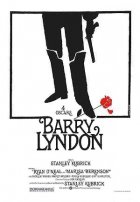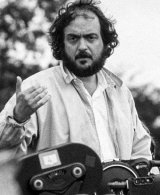
Barry Lyndon Page #16
- PG
- Year:
- 1975
- 185 min
- 1,209 Views
Roderick addresses the master, a handsome young man, and
asks him to order his driver to make way for him.
RODERICK:
I am posting, monsieur, and
furthermore I am a foreigner.
STRANGER:
Monsieur, here in Saxony, the post
has no special right, and if you are
a foreigner, you must admit that you
have no greater claim than mine,
since I am in my own country.
At that, Roderick gets out and holding his drawn-sword
tells the stranger to get out, or to make way for him.
The stranger replies, with a smile, that he has no sword
and that, in any case, he will not fight for such a silly
reason.
He tells Roderick to get back in his chaise, and he makes
way for him.
INT. GAMING ROOM - NIGHT
Roderick and the Chevalier running a faro bank when an
important lady suffers a huge loss.
RODERICK (V.O.)
The ladies were passionately fond of
play, and hence would often arise no
small trouble to us; for the truth
most be told, that the ladies loved
to play, but not to pay. The point
of honor is not understood by the
charming sex; and it was with the
greatest difficulty that we could
keep them from the table, could get
their money if they lost or, if they
paid, prevent them from using the
most furious and extraordinary means
of revenge.
EXT. ROAD - DAWN
RODERICK (V.O.)
On this evening, the lady of high
rank, after I had won a considerable
sum in diamonds and pearls from her,
sent her lover with a band of cut-
throats to waylay me.
Roderick and the Chevalier are sound asleep in their
carriage when they are awakened by a violent jolt, upon
which the carriage overturns in the middle of the road.
The Chevalier is underneath, and screams from the pain in
his right arm, which he thinks is broken.
Their servant forces the door open to help them out,
telling them that the two postilions have fled.
Roderick easily gets out of the carriage through the door,
which is above him, but the Chevalier, unable to move
because of his disabled arm, has to be pulled out.
His piercing shrieks make Roderick laugh, because of the
strange oaths with which he interlards his prayers.
From the carriage, Roderick takes his dueling pistols,
and sword.
Roderick tells his servant to mount and to looking for
armed peasants in the vicinity; money in hand, he leaves.
The Chevalier has lain down on the hard ground, groaning
and in no condition to resist robbers.
Roderick makes his own preparations to sell his fortune
and his life at the highest price.
His carriage is close to the ditch, and he unhitches the
horses, tieing them to the wheels and the pole in a
circle, and stations himself behind them with weapons.
In this predicament, Roderick cannot help laughing at the
poor Chevalier, who is writhing like a dying dolphin on a
seashore, and uttering the most pitiful execrations, when
a mare, whose back was turned to him, take it into her
empty head to empty her bladder on him. There is nothing
to be done; he has to put up with the whole stinking rain,
and to forgive Roderick's laughter, which he has not the
strength to hold in.
The chill wind and the silence are suddenly broken by an
attack, which is half-hearted and uncertain, by the lady's
lover, and his hesitant band of six cut-throats.
Some falter and run away as soon as Roderick fires his
pistol.
The leader and two heartier followers engage Roderick.
During the fight, they mortally wound the helpless
Chevalier and two of them are killed.
After they flee, Roderick kneels by the Chevalier, who
utters some appropriate last words, then dies.
His servant finally arrives at full gallop, shouting at
the top of his voice, and followed by a band of peasants,
each with his lantern, come to his rescue. There are ten
or twelve of them, all armed with muskets, and all ready
to obey his orders.
EXT. SPA - HOTEL - DAY
Roderick's carriage arrives.
RODERICK (V.O.)
After making suitable arrangements
for the Chevalier's burial, in
proper accord with his church, I
traveled to Spa, which was now in
season, alone, to continue my
profession which formerly had the
support of my friend and mentor.
Crowds surround Roderick.
RODERICK (V.O.)
I was by this time one of the best-
known characters in Europe; and the
fame of my exploits, my duels, my
courage at play, would bring crowds
round me in any public society where
I appeared.
INT. CASINO - NIGHT
Attractive women alone, while men are at the gaming table.
RODERICK (V.O.)
The passion for play is stronger
than the passion for gallantry; the
gamester at Spa has neither time to
stop to consider the merits of a
woman, nor the courage to make
sacrifices for her.
EXT. GARDEN IN SPA - DAY
The Countess of Cosgrove walks beside her husband, Sir
William Cosgrove, who is in a wheelchair. They are
accompanied by their young son, Lord Brookside, and two
servants.
RODERICK (V.O.)
In evoking the recollections of
these days, I have nothing but
pleasure. I would if I could say as
much of a lady who will henceforth
play a considerable part in the
drama of my life -- I mean the
Countess of Cosgrove, whose fatal
acquaintance I made at Spa, very
soon after the tragic events which
caused me to quit Germany.
Closer shot of the Countess.
RODERICK (V.O.)
Victoria, Countess of Cosgrove. A
Countess and a Viscountess in her
own right.
Closer shot of Sir William Cosgrove.
RODERICK (V.O.)
She was the wife of her cousin, the
Right Honorable Sir William Reginald
Cosgrove, Knight of the Bath, and
Minister to George II and George III
of several of the smaller courts of
Europe.
Closer shot of young Lord Brookside, walking behind them
in the care of his governor.
RODERICK (V.O.)
She was the mother to Viscount
Brookside -- a melancholy, deserted,
little boy, about whom his father
was more than indifferent, and whom
his mother never saw.
INT. GAMING ROOM - NIGHT
Shots of Sir William Cosgrove being wheeled in, and at
play with Roderick, and some other gentlemen.
RODERICK (V.O.)
I made Sir William Cosgrove's
acquaintance as usual at the play-
table. One could not but admire the
spirit and gallantry with which he
pursued his favorite pastime; for,
though worn out with gout and a
myriad of diseases, a cripple
wheeled about in a chair, and
suffering pangs of agony, yet you
would see him every morning, and
every evening at his post behind the
delightful green cloth.
SIR WILLIAM:
Hang it, Mr. Roderick James, you
have no more manners than a barber,
and I think my black footman has
been better educated than you; but
you are a young fellow of
originality and pluck, and I like
you, sir. because you seem
determined to go to the devil by a
way of your own.
Laughter at the table.
RODERICK:
I am obliged to observe, Sir William
Cosgrove, that since you are bound
for the next world much sooner than
I am, I will depend on you to get
comfortable quarters arranged for
me.
Laughter.
SIR WILLIAM:
Indeed, you are right, sir. Look at
me. Marriage has added forty years
to my life. I am dying, a worn-out
cripple, at the age of fifty. When
I took off Lady Cosgrove, there was
no man of my years who looked so
young as myself. Fool that I was!
I had enough with my pensions,
perfect freedom, the best society in
Europe -- and I gave up all these,
and married and was miserable. Take
a warning from me, Mr. Roderick, and
stick to the trumps. Do anything,
but marry.
Translation
Translate and read this script in other languages:
Select another language:
- - Select -
- 简体中文 (Chinese - Simplified)
- 繁體中文 (Chinese - Traditional)
- Español (Spanish)
- Esperanto (Esperanto)
- 日本語 (Japanese)
- Português (Portuguese)
- Deutsch (German)
- العربية (Arabic)
- Français (French)
- Русский (Russian)
- ಕನ್ನಡ (Kannada)
- 한국어 (Korean)
- עברית (Hebrew)
- Gaeilge (Irish)
- Українська (Ukrainian)
- اردو (Urdu)
- Magyar (Hungarian)
- मानक हिन्दी (Hindi)
- Indonesia (Indonesian)
- Italiano (Italian)
- தமிழ் (Tamil)
- Türkçe (Turkish)
- తెలుగు (Telugu)
- ภาษาไทย (Thai)
- Tiếng Việt (Vietnamese)
- Čeština (Czech)
- Polski (Polish)
- Bahasa Indonesia (Indonesian)
- Românește (Romanian)
- Nederlands (Dutch)
- Ελληνικά (Greek)
- Latinum (Latin)
- Svenska (Swedish)
- Dansk (Danish)
- Suomi (Finnish)
- فارسی (Persian)
- ייִדיש (Yiddish)
- հայերեն (Armenian)
- Norsk (Norwegian)
- English (English)
Citation
Use the citation below to add this screenplay to your bibliography:
Style:MLAChicagoAPA
"Barry Lyndon" Scripts.com. STANDS4 LLC, 2025. Web. 25 Feb. 2025. <https://www.scripts.com/script/barry_lyndon_1068>.







Discuss this script with the community:
Report Comment
We're doing our best to make sure our content is useful, accurate and safe.
If by any chance you spot an inappropriate comment while navigating through our website please use this form to let us know, and we'll take care of it shortly.
Attachment
You need to be logged in to favorite.
Log In